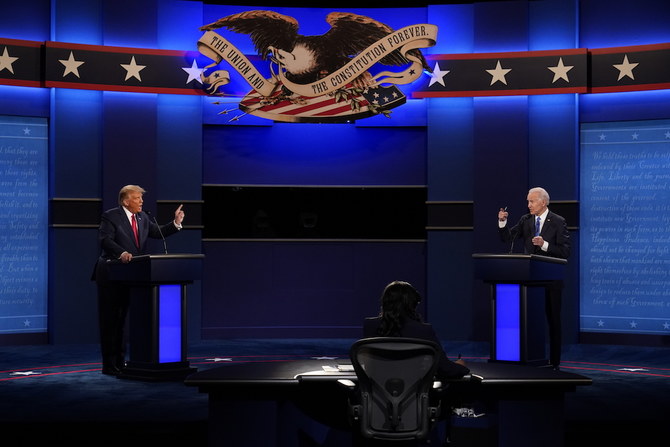Iranian regime braced for most important US election

https://arab.news/b87d6
Since the establishment of the Iranian regime in 1979, Tehran has lived through 10 US presidential elections and seven presidents; three Democratic administrations and four Republican. However, the 2020 election is, without doubt, the most critical one for the ruling clerics of Iran.
If the Democratic nominee and former Vice President Joe Biden scores a victory in Tuesday’s election, Tehran is hoping that economic sanctions will be lifted and Washington will return to the Joint Comprehensive Plan of Action (JCPOA) nuclear deal. An editorial published by the Tehran Times last month echoed such a hope. It said: “(Donald) Trump’s presidency is nearing its end while he is trailing his Democratic rival Joe Biden, who famously pledged to rejoin the JCPOA if he wins… a move that is understood by some analysts in the West as a reason why Iran keeps exercising restraint in the face of Trump’s provocative measures, such as imposing sanctions on almost each and every sector in the Iranian economy.”
Iran’s hope is not unrealistic, since Biden has repeatedly expressed his intentions to rejoin the nuclear deal and pursue diplomacy with Tehran. In an opinion piece for CNN, he pointed out: “I will offer Tehran a credible path back to diplomacy. If Iran returns to strict compliance with the nuclear deal, the United States would rejoin the agreement as a starting point for follow-on negotiations. With our allies, we will work to strengthen and extend the nuclear deal’s provisions, while also addressing other issues of concern.”
However, this does not mean that the Iranian regime is seeking to normalize relations with the US. In fact, opposing the “Great Satan” is a core pillar and policy of the regime. But, while Supreme Leader Ali Khamenei wants to keep the US as Iran’s No. 1 enemy, he is desperate for economic relief.
Iran’s oil exports are at a record low, unemployment and inflation are high, people’s anger and frustration with the theocratic establishment continue to rise, and the regime is finding it extremely difficult to pay its militia groups across the region. The Iranian people’s purchasing power has significantly dropped as the nation’s currency continues to lose its value. Social security funds and banks are on the verge of bankruptcy and total collapse. And, on top of all that, the coronavirus disease pandemic has added another layer of pressure on the economy.
While Supreme Leader Ali Khamenei wants to keep the US as Iran’s No. 1 enemy, he is desperate for economic relief.
Dr. Majid Rafizadeh
For Tehran, the 2015 nuclear deal was the perfect pact because it helped the regime rejoin the global financial system and increase its oil exports. And, more importantly, Iran remains in favor of the JCPOA because it does not address its human rights violations, ballistic missile activities, the regional military adventurism of the Islamic Revolutionary Guard Corps, and Tehran’s support for terror and militia groups, which are behind its destabilization of the broader region. That is partially why the Iranian leaders have repeatedly refused to renegotiate the deal with President Trump.
Put simply, the Iranian regime cannot afford another four years of Trump. The economic pressure is so dire that, if he were to secure another term, the regime may even collapse. The state-run Arman daily acknowledged in September: “A glance at what we witnessed in forms of protests in recent years shows that these protests started in areas where people are suffering from poverty and have difficulties earning their living wages. The economic pressure that lower social classes endure is unbearable. We should be careful that they do not lose their tolerance because this could have social and security consequences (for the government).”
This is why the regime is utilizing every possible tool to influence the outcome of the US election in Biden’s favor. In the final days of the campaign, Iran was caught obtaining US voter registration information. US Director of National Intelligence John Ratcliffe said: “This data can be used by foreign actors to attempt to communicate false information to registered voters that they hope will cause confusion, sow chaos and undermine your confidence in American democracy... We have already seen Iran sending spoof emails designed to intimidate voters, incite social unrest and damage President Trump.”
The regime also resorts to other means, such as launching disinformation campaigns by spreading fake news through social media outlets. It generates and disseminates fabricated headlines and videos, and propagates doctored pictures. Previously, Twitter and Facebook banned hundreds of accounts linked to the regime.
The outcome of Tuesday’s election could have severe repercussions for the regime and its hold on power.
* Dr. Majid Rafizadeh is a Harvard-educated Iranian-American political scientist. Twitter: @Dr_Rafizadeh









































